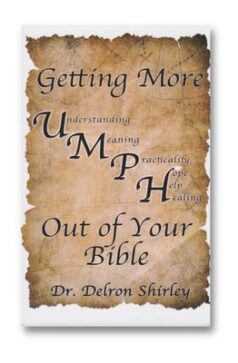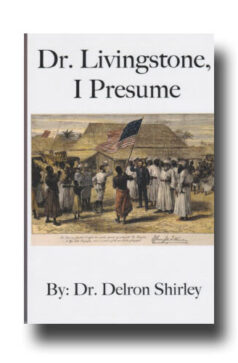Once you have decided which Bible you are going to study and made the determination in your heart that you are going to be the plot of the fertile soil that Jesus referred to as becoming productive when it received the Word of God, the first step to getting some “umph” out of your time with the Word of God is to consider how to actually understand what you are reading.
In the eighth chapter of Acts, we find the story of Philip’s encounter with the treasurer for the queen of Ethiopia who was studying Isaiah’s prophecy concerning Jesus’ crucifixion. When the evangelist saw what he was reading, he questioned the gentleman, “Do you understand what you are reading?” His answer was simple, “How can I, except some man should guide me?” But before we take this passage and turn it into a dogma, we have to consider the various implications and possible ramifications of the incident. In this particular case, the eunuch had a good answer – in fact the perfect answer – because he happened to be talking to someone who was an honest man who was full of the Holy Spirit and wisdom (Acts 6:3) and who had been specifically sent to him by the Holy Spirit (Acts 8:29). However, we must not automatically assume that we need a teacher or a commentary to help us understand the Scriptures. As we saw in the last chapter, the traditions and teachings of men can make the Word of God ineffective in our lives. Therefore, we must learn to be cautious of simply relying upon others’ interpretations of the Bible. In the “warning” section, I gave some humorous examples of misinterpretations of Bible passages and concluded that, even though they were laughable, they were tragedy rather than comedy! The Apostle John wrote, But the anointing which ye have received of him abideth in you, and ye need not that any man teach you: but as the same anointing teacheth you of all things, and is truth, and is no lie, and even as it hath taught you, ye shall abide in him (I John 2:27) – a statement that seems to be a blatant directive that we should not rely upon teachers within the church. Of course, I wouldn’t be wasting my time writing this book if I felt that we should receive this interpretation as an exact message from God. However, we must realize that – even in the very first years of the church – there was already a plethora of gospel substitutes floating around in the church: philosophy (Colossians 2:8), vain deceit (Colossians 2:8), the tradition of men (Colossians 2:8), the rudiments of the world (Colossians 2:8), enticing words of man’s wisdom (I Corinthians 2:4), profane and vain babblings (I Timothy 6:20, II Timothy 2:16), oppositions of science falsely so called (I Timothy 6:20), fables (I Timothy 1:4, II Timothy 4:4), Jewish fables (Titus 1:14), profane and old wives’ fables (I Timothy 4:7), cunningly devised fables (II Peter 1:16), endless genealogies (I Timothy 1:4, Titus 3:9), the commandments of men (Titus 1:14), foolish and unlearned questions (II Timothy 2:23, Titus 3:9), teachers having itching ears (II Timothy 4:3), teaching things which they ought not for filthy lucre’s sake (Titus 1:11), strivings about the law (Titus 3:9), the commandments of men (Matthew 15:9, Mark 7:7), the doctrines of men (Colossians 2:22), strange doctrines (Hebrews 13:9) and even doctrines of devils (I Timothy 4:1). This is exactly the issue that John was addressing when he penned these words saying that his disciples didn’t need any man to teach them. In fact, the full context of his statement is a warning against teachers of error who were bent on seducing the believers. (I John 2:18-26) John gave the believers two standards that substantiated the truth that they were to believe – the word of trustworthy teachers (I John 1:1-5) and the anointing of the Holy Spirit (I John 2:21, 2:27). I wish to reserve comments on the Holy Spirit’s role for the next chapter; however, it is noteworthy that the position of legitimate teachers is validated multiple times in the New Testament. (John 3:2; Acts 13:1; I Corinthians 12:28, 12:29; Ephesians 4:11; I Timothy 2:7; II Timothy 4:3; Titus 2:3; Hebrews 5:12)
We should feel free to receive teaching and instruction from trustworthy teachers and we should render them due honor and respect (I Timothy 5:17); yet, we must always be cautious about accepting too readily the opinions of others since the Bible itself warns that those who instruct us open themselves up to a greater condemnation if they lead the Body of Christ astray. (James 3:1) Not all teachers who direct us incorrectly are natural brute beasts, made to be taken and destroyed, who speak evil of the things that they understand not; spots and blemishes, sporting themselves with their own deception while they feast with us; having eyes full of adultery and unable to cease from sin; beguiling unstable souls; exercising their hearts with covetous practices; cursed children who have forsaken the right way and are gone astray; who love the wages of unrighteousness; wells without water; clouds carried with a tempest; for whom the mist of darkness is reserved for ever; speaking great swelling words of vanity; those who allure through the lusts of the flesh, through much wantonness; teachers who promise liberty while they are still servants of corruption. (II Peter 2:12-19) In fact, most of the misinformation that is disseminated in the church today is by well-meaning and honest teachers who are simply repeating what they have learned from others and those who – like the translators that we discussed earlier – see things through glasses that are tinted by their own backgrounds, training, and experiences. Additionally, there are those who have become victims of the “cafeteria approach” to the Bible that I alluded to in the “warning” chapter. They pick and choose what they like rather than taking everything. Because they see only a narrow bandwidth of the total spectrum of the biblical message, the result can be likened to the old saying, “A half-truth is a whole lie.”
Allow me to begin with a simple example. We often see passion plays and hear eloquent sermons describing Jesus’ descent into hell after the crucifixion to fight and defeat the devil and return from Hades victoriously displaying the keys to death and hell which He had successfully wrenched from Lucifer’s hand. Although these images are certainly dramatic and stirring, they are radically contradictory to biblical truth. If Jesus had one more round to fight against the devil, why did He proclaim, It is finished! as He drew His last breath? (John 19:30) Actually, it would have been impossible for Jesus to have confronted Satan in hell because the devil wasn’t even there! According to Revelation 20:10, he won’t go there until the final judgment and, according to Ephesians 2:2, his present domain is the atmosphere around the earth rather than the regions beneath it. Additionally, there is no scriptural reference to the devil’s ever having had possession of those keys and, since Revelation 20:1 portrays an angel as having the key to the bottomless pit, it seems likely that those keys were always in God’s possession. The truth is that Jesus had a totally different reason for going into hell – to complete the mission that brought Him from heaven to earth. On the cross, He brought salvation and the possibility of going to heaven to those who were alive and those to come in future generations, but it was in His descent into hell that He was able to release those who had died prior to His coming so that they could also go to heaven. They were held in Sheol and could only go to heaven once they received the message of the cross (Ephesians 4:8-10, I Peter 3:19) – a truth that is far beyond the limitations of this volume; however, you can read the full explanation in my book You’ll be Darned to Heck if You Don’t Believe in Gosh. Here, we see a splendid example of error that has been transmitted by well-meaning teachers, preachers, and dramatists with no malicious intent whatever; they simply have been repeating what they were told (the traditions of men) without thoroughly studying the Bible itself. Although this example may seem innocuous, we must remember that it is such traditions of men that render the Word of God ineffective!
So, how can we avoid such pitfalls? The simple answer is to read the Word of God orderly – systematically. Orderly study is a regimented reading through the Bible involving reading all the Bible – including the portions we don’t understand or find boring. It is often in these “mundane” portions of the Bible that we find clues that help us understand principles in other sections. It can be likened to finding the key to a lock in a drawer when you weren’t even looking for it. For example, Bruce Wilkinson ran across the short biography of Jabez in I Chronicles 4:9-10, And Jabez was more honourable than his brethren: and his mother called his name Jabez, saying, Because I bare him with sorrow. And Jabez called on the God of Israel, saying, Oh that thou wouldest bless me indeed, and enlarge my coast, and that thine hand might be with me, and that thou wouldest keep me from evil, that it may not grieve me! And God granted him that which he requested, and wrote The Prayer of Jabez which became an international bestseller, sold nine million copies, topped the New York Times bestseller list, and earned the Evangelical Christian Publishers Association Gold Medallion Book of the Year award. The amazing thing about this story is that the story of Jabez is just two verses out of a section of more than four hundred verses of genealogies and other pedantic details. Just imagine what the author – and the Body of Christ – would have missed out on had he not believed in reading the Bible orderly – even the boring parts!
Orderly study of the Word of God gives us an over-all perspective that helps make sense of isolated passages that might otherwise be unclear, confusing, or even misleading. For example, there is a major emphasis on circumcision in the New Testament; however, we wouldn’t even understand what the ritual was unless we had read the Old Testament law where it was instituted. Additionally, we would think that Paul’s perspective in the New Testament is contradictory to the Old Testament teaching if we were not aware of the statements in the tenth and thirtieth chapters of Deuteronomy which explain that circumcision is actually a process of consecrating the heart rather than mutilating the flesh.
Orderly study of the Bible demands that we take time to look up the words that are used in the passage to ensure that they mean what we think they mean. We have already seen the value of this sort of study in the previous chapter where we examined the difference between logos and rhema – a valuable insight that could never be discovered by simply assuming that every reference to the term “word” carried exactly the same meaning. You might consider each individual word as an important building block and study it as if through an inverted triangle in which the entire Bible is brought to focus on that specific word. First, consider what the word means in the verse you are reading. Then read the verses before and after it. Continue to widen the scope of your study by contemplating the meaning of that term in the context of the entire chapter, followed by the preceding and subsequent chapters. Then, ponder its meaning in the entire book and all similar books (for example: if you are studying a verse from one of Paul’s epistles, compare it to all of Paul’s writings; if you are studying a passage from one of the gospels, compare it to the other three gospels). Next, consider the word’s usage in the entire testament and then the whole Bible. Obviously, we are not able to read the whole Bible every time we want to study a verse. Therefore, we must use a few study aids to help us along. The first resource we can turn to is a concordance that lists all the occurrences of each word in the Bible. However, we can make a major error if we use the most common and popular concordances on the market. These listings are made on the English version of the Bible and are, therefore, often misleading since the Bible was written in Hebrew and Greek, and the words are not always translated the same way when taken into the modern tongue. There are, for example, several Greek words that are rendered “love” in English. If we do not recognize when the various words are used, we will fail to catch the nuances – and sometimes the full meaning – of the passages. An excellent example is the post-resurrection seaside encounter between Peter and the Risen Christ. We can easily think that Peter was upset because Jesus asked him three times if he loved Him. The disturbance actually came from the fact that Jesus changed the wording for “love” on the third query – indicating that He recognized that Peter was not at the spiritual level of love that the Master wished him to be. Although some concordances attempt to solve this kind of problem by listing a key number next to each verse to indicate that a different Greek or Hebrew word is being translated, this does not solve all the problems in that the same Greek or Hebrew word may be translated differently in different verses. For example, the Greek term meaning “immediately” is translated “straightway” in approximately half its appearances in the New Testament. This would mean that even though you may study all of the listings in the concordance, you would have only done half of your job in researching the term. Therefore, it is mandatory that you use a tool such as the Word Study New Testament and Concordance in which you can get a listing based on the Greek term, regardless of how it is translated in English. With a tool like this, you can quickly search the entire New Testament and get a good feel of how that word should be interpreted. In the wonderful technological age in which we live, there are numerous computer programs that allow you to do this same kind of research for both the Old and New Testaments with just a few keystrokes.
At this point, I must share an example that dramatically illustrates how tragically we can miss the point when we fail to do this sort of study. I once knew a minister who based his ministry on a phrase from Psalm 31:23 which states that the Lord will reward the proud doer. The whole foundation of his outreach was that God would reward him because he was unashamed to perform the ministry he was called to do. Although the concept itself may be accurate, it certainly was not the thought that the psalmist – or the Holy Spirit – was trying to convey in this passage. If my friend had only taken the time to understand the meaning of “proud” and “reward,” he would have realized that this passage was declaring God’s judgment upon those whose actions are motivated by a sense of self-importance! Although we may have to use all the study aids I have mentioned to find the meanings of some words, the process may not be nearly so daunting if we simply take time to read the passages in various translations. Since each translator expresses himself a little differently, it is likely that reading enough translations will yield enough insight into the possible renderings that we can overcome any understandings that would result from reading only one translation. For example, the Amplified Bible clearly debunks the erroneous interpretation about the reward of the proud doer and defuses the argument of the speaker I mentioned in the “warning” chapter who declared that Jesus turned a desert into a green meadow on the day that He multiplied the bread and fish.
In addition to making sure that we understand the meanings of the words that are present in a text, we also have to be certain that we aren’t making erroneous assumptions by adding in words that aren’t even there. Let’s look at Ephesians chapter six as an example. We assume that the chapter is a teaching on spiritual warfare since it tells us about putting on the armor of God; however, Paul’s message is really about standing still and seeing God’s victory – not about fighting to gain a place of authority over the enemy. Three times in a section of four verses (Ephesians 6:11-14), Paul directed the believers to stand. The one verse that doesn’t specifically use that word is actually missing a verb to carry the meaning of the sentence. Since Paul used “stand” repeatedly in this context, it is totally logical that he intended that we would insert that same verb into the blank. Unfortunately, we generally pick up the verb “wrestle” from the first part of that sentence and insert it – totally changing the intended meaning of the text. Furthermore, when Paul mentioned wrestling, he told us to not wrestle against flesh and blood beings; therefore, why should we feel that it would be appropriate to wrestle against spiritual entities. In Romans 8:37, the apostle told us that we are more than conquerors; unfortunately, we want to be the ones who go fight the devil so we can be conquerors. The truth is that Jesus has already defeated the enemy and all we need to do is stand – as more than conquerors – in the victory that He has already secured. I’m sure that this quick explanation has left many of my readers questioning my observations and conclusions I draw from them, but there isn’t space to expound here; therefore, I suggest that you read my book Finally, My Brethren for the full exposition.
As I’ve already mentioned, there are often a number of words in the original language that have similar meanings, but have just enough variance to make a difference. However, if you are in the same boat with me – that of failing to be a recognized linguist – you’re not totally out of luck. There are wonderful tools available to help us discover biblical truths that are not readily apparent in English. In the example we have already considered, there was a significant reason why the words for “love” were shifted in John 21:17. Whenever there is a choice of words, we must consider why the one that was used was chosen. W. E. Vine’s Expository Dictionary of New Testament Words is an excellent tool for finding the nuances of the various words and gaining an insight as to why and how they were used. Such tools as a gospel parallel can help in comparing passages that are repeated in the four gospels. Doing such a comparison could be very insightful in studying such concepts as the use of the term “kingdom of God” versus “kingdom of heaven.” Another excellent resource to help with this aspect of the research is the Discovery Bible that makes these same comparisons but also has the added benefit of showing the tenses of the verses. Since English does not have all the same grammatical structure as the biblical languages, we may often miss the point and misinterpret the verses if we cannot comprehend the movement implied in the original context. For example, we can be very confused when we read in I John 3:9 that believers cannot sin if we do not understand that the verb tense used in this verse means that we do not practice a lifestyle of continuous sinning.
In the real estate business, it is said that the value of a piece of property is determined by three factors: location, location, location – a principle I learned the hard way with my first starter home. Shortly after we were married, Peggy and I bought a “fixer-upper,” and I immediately started doing all the repairs to get it up to muster – totally oblivious to the fact that no one else in the neighborhood was investing any loving care into their homes. When we decided to sell the house and buy a little nicer home in a neighborhood near my work, I told the realtor what I wanted out of the house – our original investment plus the cost of all the renovations I had done. He frowned and asked me to step outside with him. Pointing to the house to the right, then to the one on the left, and then to the one across the street, he said, “No one will ever pay that price to live next to these people.” My neighbors – not my financial investment and “sweat equity” – had determined the value of my house. The same is true of the meaning of a biblical passage: it is determined by the passage’s location, location, location. This concept brings us to one of the most important aspects of studying a passage – find out what it means from where it sits in its context. I am such a believer in this principle that I refuse to mark in my Bible. Some people think that I’m just not “spiritual” since I don’t underline, highlight, or put stars and asterisks next to verses that really “speak” to me. The truth is that once a verse is singled out by underlining, highlighting, or other markings, it is isolated from its environment – a separation that violates its context and, therefore, its full meaning. I would really love to spend the rest of this book giving examples of how this principle works; however, I will force myself to restrict my comments to just three examples. If you would like more, please check out my Verse for the Day volumes where you can see this approach in action.
How many times have we heard someone say to a person who has just gone through a great trauma or is in the middle of a devastating situation, “Everything’s gonna be okay,” or “It’s all gonna work out”? Many times, they base their idea that everything’s going to be okay on the biblical promise that all things work together for good for those who love God and are called according to His purpose. (Romans 8:28) In fact, I’ve heard people quote that verse in all kinds of tragic conditions – prolonged illnesses that ran up unsurmountable hospital and medical bills complicated by the loss of income due to not being able to work, loss of an automobile due to an accident with an uninsured driver, or loss of a home that was not adequately covered by insurance, and the list could go on and on. When faced with such a horrible situation, it is definitely necessary to keep a positive attitude and believe that God will turn what the devil meant for evil around for our good (Genesis 50:20); however, if we really understood the power of this verse, we would never have to use it to encourage ourselves that everything’s going to be okay since this verse is actually intended to help us live victoriously over the attacks that are intended to get us in the destructive condition in the first place. The one thing that I always notice about people who reference Romans 8:28 as proof that everything’s going to be okay is that they fail to include the first word in the verse – “and.” Since the sentence begins with a conjunction, we must include the previous thought in order to accurately understand the verse. That thought begins in verse twenty-six which says that the Holy Spirit will help us when we don’t know how to effectively pray about things. The thought continues in verse twenty-seven where the apostle tells us that such prayers are always in the will of God because they are formulated by the One who knows the mind of God. The source of the weakness and ineffectiveness of our human prayers is the lack of unquestionably knowing the mind of God on the issue. The truth is that we often limit the hand of God because we insist on praying for one thing when God is just waiting for us to quit begging Him to do that thing so that He can do something far bigger and better for us. After all, He is the God who does things that are more extravagant than we could ever imagine or dare to ask for. (Ephesians 3:20) On the flip side of the coin, the key to effective prayer is knowing that the petitions we are making are in direct correlation with what God already has in mind to do for us. (I John 5:14-15) At this point, it is important to remember that the thoughts that He is thinking toward us are always good and never harmful and that they are to bring us prosperity and success. (Jeremiah 29:11) In other words, He doesn’t intend for us to get into situations where we need for everything to be okay and look for a way for things to work together for our good. Everything should always be okay and good for us.
In the second example I wish to propose, I want to revisit the “spiritual warfare” message of Ephesians chapter six. How many times have we heard messages from this portion of scripture that encourage us, “Having done all to stand, stand therefore,” with the implication of having done everything we know how to do and we have run out of all the tricks of the trade – then, when there is nothing else to do – we just staunchly keep on keeping on. That may be a good philosophy, but that is not what the scripture is saying. Notice that there are a couple commas in this sentence. One comes after the word “day” and the other comes between the words “all” and “to.” The commas indicate to us that there is a parenthetical phrase that has been added into the sentence. We can remove the parenthetical phrase, and the sentence has exactly the same meaning. There is a little clarification given by having put the parenthetical phrase in, but the clarification is not necessary to convey the intended meaning of the sentence. Taking the parenthetical phrase out of this verse gives us the basic meaning of the text. Without the added information, the sentence becomes easier to read and we can see exactly what Paul is saying to us. The verse would then say, “Therefore, take up the whole armor of God that you may be able to withstand in the evil day…and to stand.” This is the basic meaning of what Paul was saying here. The next sentence (which we usually blend into this thought) is actually a separate thought. Notice that there is a period that indicates a break in the flow between verse thirteen and verse fourteen. With this understanding, it is clear that Paul is telling us to take up the whole armor of God for two purposes: that in the evil day we can withstand and we can stand. The parenthetical phrase that we dropped out of verse thirteen reads, “having done all.” Some translations include the alternate wording “having overcome all” leaving the impression that we will be able to stand after we have defeated all our obstacles. Such a reading can be misleading in that it implies that we are the ones doing the overcoming when, in fact, it was Jesus Christ who won the victory through His crucifixion and resurrection. It seems more in keeping with the overall theme of the passage to keep the traditional reading, “having done all.” Once we have taken care of all the points that Paul mentioned in the first five and a half chapters of the book, we finally come to the point of putting on our armor and taking our victorious stance.
This example gives me a chance to address another issue that we must be aware of when reading the Bible – the Greek language did not use punctuation at the time that the New Testament was being written. Therefore, it could be legitimately argued that the explanation I have just given is moot in that Paul didn’t put in those commas and the period I have so adamantly defended. However, that case would be hard to defend based on the context. Since verses eleven, twelve, and fourteen are all independent thoughts, it would be a violation of the text to consider verse thirteen as an incomplete sentence that needs to borrow words from the beginning of the following verse.
The next example that I wish to discuss will give us an opportunity to examine another issue we inherited from the fact that the New Testament was written in ancient Greek – the fact that there were no capital letters in the language at the time. Perhaps one of the most significant problems that arises from this fact is that we have to decide when it is appropriate to use a small “s” for the word “spirit” so that it indicates our human spirit and when it should be understood as being the Holy Spirit with a capital “S.” Any references to the spirit that begin with a capital “S” are actually the work of later translators – or, as we have already seen, interpreters. In Romans 8:1, 8:4, Galatians 5:16, and 5:25, Paul makes the distinction between walking in the spirit rather than walking according to the flesh. In each reference, the King James Bible chooses to use a capital letter, suggesting that we are to walk according to the Holy Spirit; however, the logical analysis of the verse would be that our human spirit is to be contrasted against our human flesh. If Paul were intending to contrast the Holy Spirit against an alternate way of directing our lives, he would have reasonably referred to the spirit of this world – referring to the devil. (Ephesians 2:2) Thus, the context of these passages actually overrules the precedent set by the translators. The message that Paul was trying to communicate is that our lives must be directed by our born-again human spirit rather than our unregenerate flesh. Additionally, when the apostle contrasted the works of the flesh and the fruit of the spirit in Galatians 5:19-23, the King James translators used a capital letter when writing “Spirit.” However, the logical conclusion from the context is that they should have used a small letter since the contrast is between something that is produced by our human spirits in opposition to something that is produced out of our human flesh. Had Paul been intending to talk about the fruit that comes from the Holy Spirit, he certainly would have contrasted it with something that is the product of the devil. One other instance in which this matter is significant is the three different references to the seal of the Spirit. (I Corinthians 1:22; Ephesians 1:13, 4:30) In each case, the King James translators use capital letters, indicating that the agent of the sealing is the Holy Spirit. However, the choice of the capitalization is actually not arbitrary in these verses since the context itself demands that we recognize that it was Paul’s intention to speak of the Holy Spirit. In the Corinthian reference, he speaks of being given the earnest of the Spirit in our hearts. Since our hearts are our human spirit, then what we are given must be something different – the Holy Spirit. The Ephesian passages literally identify the Spirit as the holy Spirit of promise and the holy Spirit of God. Unfortunately, most of the popular teaching today speaks of the seal as a guarantee that has been placed on our human spirits – ignoring the capital “S.” In this case, we are doing a great injustice to the scriptures to confuse the capitalization. The seal that Paul is talking about is a seal that is placed on our total lives – body, soul, and spirit (II Thessalonians 5:23) – by the Holy Spirit, not a seal that applies to only our human spirits. When we differentiate between our spirits and the rest of our personality, we open the door to error by allowing ourselves to believe that our spirits are sealed unto the day of redemption and that our bodies and souls are outside that seal. Thus, we can easily develop a dichotomy in our thinking – we can do anything and believe anything, and it will not affect our spirits. This understanding can suggest that we can do all sorts of ungodly things in our outward personality without damaging our inward man. If we go back to the understanding that Paul’s instructions were that we walk according to our human spirits and produce the fruit that is geminated in our human spirits, we must understand the powerful summation he makes to the discussion in Galatians 5:25 to say that it is possible to live in our spirit man but not walk according to the direction of the new nature of our born-again spirits in our physical lives. In such a case, we continue to produce the works of the flesh rather than allowing the fruit of the spirit to manifest. The end result is that we cannot inherit the kingdom of God (Galatians 5:21), which Paul described in Romans 14:17 as the righteousness, peace, and joy that the Holy Spirit gives.
Before we leave this topic, I want to circle back to a statement that I made early on in the chapter – that we should feel comfortable receiving instruction from qualified teachers – many of whom have written excellent commentaries and tools to help us in our study of the Scripture. As I suggest that you feel free to use such tools, I want to cautiously warn that even the most valuable resource can also become a serious handicap if used as a crutch or shortcut in your study. Good commentaries follow basically the same approach I have suggested to you with the added benefit of incorporating the historical facts which help explain practices, customs, and thought patterns of the time. Such input is invaluable; however, it should never be taken as ultimate truth. I make a practice of never reading commentaries until after I have done my personal research because I don’t want my reasoning clouded by other people’s opinions while I am still trying to understand the passage for myself. Once I feel comfortable with my discoveries and evaluations, I turn to the commentaries to see if they agree or disagree with my conclusions. If they agree, then I have some added substantiation for my conclusions. If a commentary disagrees with my conclusion, I study the case carefully to see if it is more logical than mine, meaning that I need to readjust my thinking. However, I never automatically yield my ground just because the other opinion is in a published book. If I have studied prayerfully, carefully, and thoroughly, my observations are just as valid as the ones in the book. If I can confidently defend my position, I hold to it. After all, I have just as much opportunity to be right as the next guy! I wish to leave you with two suggestions as to the very best commentaries to use – the Word of God and the Holy Spirit. As we have seen throughout the lesson on studying the Word with an orderly approach, the Bible is the best commentary on itself. We will see in the following chapter on approaching the Word worshipfully that the Holy Spirit is the only true interpreter of the meaning of the Bible. After all, He is the one who inspired its authors!










